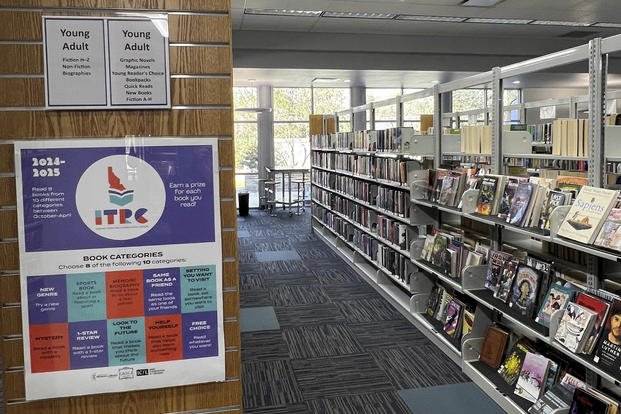A federal judge has ordered the Department of Defense Education Activity (DoDEA) to put hundreds of banned books back on the shelves at schools for military families.
Judge Patricia Tolliver Giles ruled on Oct. 20 that the Pentagon’s removal of books dealing with race and gender likely violated students’ First Amendment rights. Her order in E.K. v. Department of Defense Education Activity sides with six military families whose children attend DoDEA schools in Quantico, Virginia; Fort Campbell, Kentucky, Italy and Japan. DoDEA serves about 67,000 students in 161 schools worldwide.
The suit stems from an April 12, 2025, complaint in which 12 students from six military families attending five DoDEA schools brought claims against the DoDEA, DoDEA director Beth Schiavano-Narvaez, and Defense Secretary Pete Hegseth, alleging that "through its censorship, DoDEA is prohibiting its educators from meeting plaintiffs’ expectations." Students' grade levels ranged from pre-kindergarten to high school.
Giles’ order, delivered in the U.S. District Court for the Eastern District of Virginia and which granted a preliminary injunction, requires DoDEA to restore the removed books within 30 days and publish the full list of affected titles. She cited the 1982 Supreme Court decision, Island Trees v. Pico, which found that public schools cannot remove books simply because officials disagree with their content.
The Pentagon told Military.com it has “nothing to provide” in regards to the ruling.
Military.com reached out to DoDEA about how or when the books will be restored or whether the agency plans to appeal. They did not respond by press time.
Groups Celebrate 'Solid First Step'
The American Civil Liberties Union (ACLU) of Virginia and ACLU of Kentucky, representing the families, called the ruling “a victory for the freedom to read.”
Emerson Sykes, senior staff attorney with the ACLU’s Speech, Privacy and Technology Project, said in a statement that students in DoDEA schools “have the same First Amendment rights as all students.”

The nonprofit organization PEN America, which fights against book banning and encourages free expression in literature, said Giles' ruling is "a solid first step in a long road to restoring and protecting students’ freedom to read in schools run for military families."
“The scale of book removals across schools for military families in response to edicts from the White House is a further escalation of the book banning crisis and comes on the heels of four years of coordinated efforts to suppress and restrict reading material for public school students nationwide," PEN America’s Freedom to Read Program Director Kasey Meehan said in a statement.
Classics Pulled From Shelves
That suit filed in April claimed the department’s school system “whitewashed curricula” and “quarantined” books about race, gender and identity. Families claimed the removals were carried out to comply with executive orders signed by President Donald Trump earlier this year, which banned “gender ideology” and “divisive concepts” in federal programs.
“DoDEA is scrubbing references to race and gender from its libraries and lessons with no regard to how canonical, award-winning, or age-appropriate the material might be,” the complaint stated.
The parents who compose the plaintiffs argued that that the government has “deprived students of access to works that foster understanding and empathy.”
Court filings indicate that DoDEA officials instructed librarians to remove or relocate books linked to “gender ideology” or “discriminatory equity ideology.” Those titles were sent to restricted staff collections, cutting off student access.
Among the books removed include To Kill a Mockingbird, Fahrenheit 451, The Kite Runner, and No Truth Without Ruth, the latter being a children’s book about former Supreme Court Justice Ruth Bader Ginsburg.
Teachers were told to pause observances such as Black History Month and Pride Month, and to modify lessons that included gender or race discussions.
The ruling could have broad effects on how the federal government oversees classroom materials at its own schools and may shape future fights over book bans nationwide.












